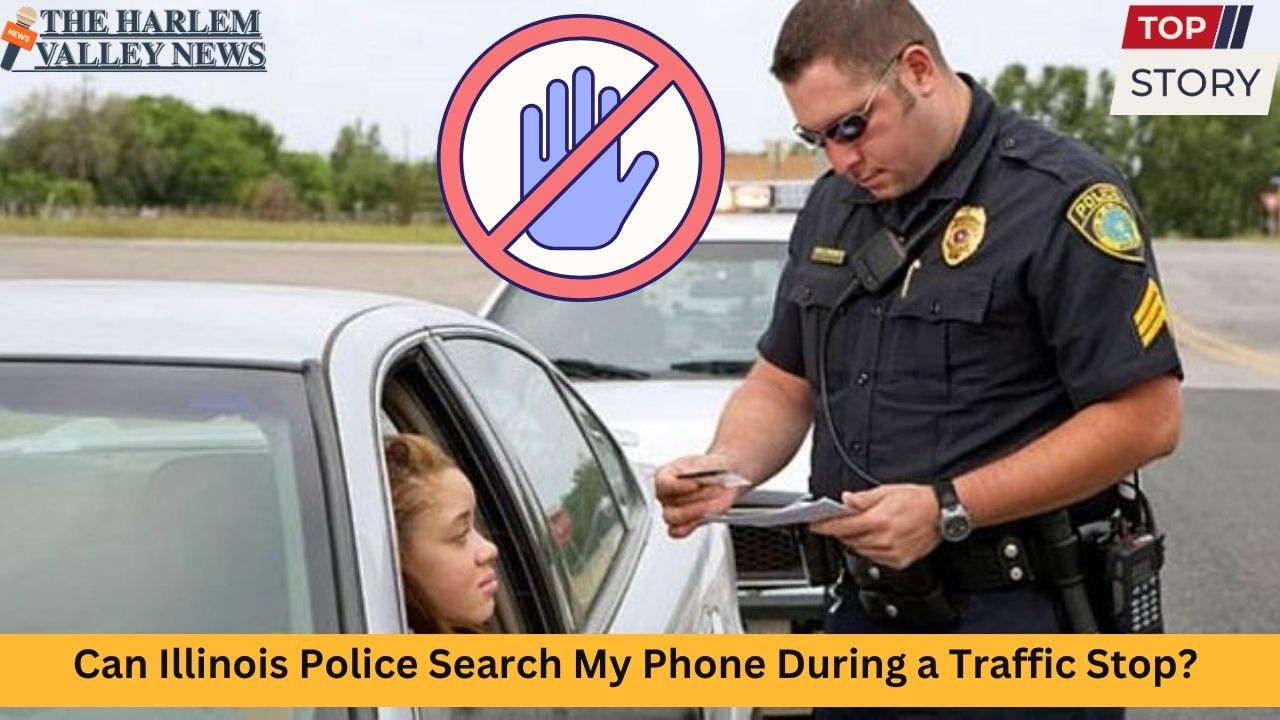Imagine you’re cruising down Lake Shore Drive in Chicago or rolling through downtown Rockford when red-and-blue lights flash in your rearview mirror. After you pull over, the officer strolls to your window, and, after a brief exchange, asks, “Can I see your phone?” What do you do? Are you legally required to hand it over, or can you refuse? With smartphones holding vast amounts of personal data, it’s crucial to understand your rights during a traffic stop in Illinois.
This comprehensive guide covers your rights and the law about phone searches by Illinois police during traffic stops. We’ll look at recent court decisions, what qualifies as “consent,” key exceptions, city-specific stats, and practical steps you should take to protect your privacy.
Understanding Your Privacy Rights in Illinois
Whether you’re in Aurora, Joliet, or Champaign, your phone is legally considered a highly private possession, protected by state and federal law. Modern phones store messages, emails, photos, GPS records, app data, and much more. The law recognizes that a phone contains the intimate details of your life—details far exceeding those in your pockets or glove box.
The Fourth Amendment and Illinois State Law
The Fourth Amendment of the United States Constitution protects against unreasonable searches and seizures. Illinois law mirrors this protection, ensuring that police cannot arbitrarily search a person, vehicle, or electronic device without a proper legal basis.
In most situations, law enforcement in Illinois needs either a warrant or your explicit consent to search your phone during a traffic stop. Important:
-
You are required to show your driver’s license, registration, and proof of insurance during a stop.
-
Passengers are not usually required to identify themselves unless there is reasonable suspicion of criminal activity.
-
Anything beyond these requirements—like searching your phone—demands additional legal justification.
When Can Police Legally Search Your Phone?
There are limited exceptions that allow law enforcement in cities like Peoria or Springfield to search your phone without a warrant:
The Consent Exception
If you voluntarily hand your phone to the officer or unlock it for them, you have given consent. Law enforcement officers often phrase their request in a way that makes you feel obligated, but you are not required to give consent. Consenting, even reluctantly, allows the officer to search your device and use any information found against you.
Search Incident to Arrest
In the past, police could search personal effects after arresting someone. However, the U.S. Supreme Court has drawn a sharp line: searching the data on a phone is not permitted without a warrant, even if you’re under arrest. Police, however, can physically seize the phone and hold it as part of evidence collection until a warrant is obtained.
Exigent Circumstances and Probable Cause
There are rare emergency cases when an officer can search your phone without a warrant—such as preventing imminent harm or the destruction of crucial evidence. If the officer believes someone is in danger, or evidence is about to be erased, a search without a warrant may be allowed. However, these situations are exceptional and must be justified in court.
Plain View Doctrine
If illegal activity is immediately visible on your home screen (for example, contraband images or illegal texts appear as notifications), police may seize the phone as evidence. However, entering the phone and navigating its contents still typically requires a warrant.
What Recent Supreme Court Rulings Say
The landmark Supreme Court case, Riley v. California, set the modern rule nationwide—including Illinois: Police must obtain a warrant to search your phone during or after a traffic stop, except in special, narrowly-defined circumstances.
The Court acknowledged that a phone isn’t like a wallet or bag due to the sheer volume and sensitivity of data it holds. Therefore, its contents are protected under the Fourth Amendment. For Illinois drivers and residents in cities like Naperville or Waukegan, this means your digital privacy has strong legal backing.
What Happens If You Refuse a Search?
If an officer in Berwyn, Elgin, or Carbondale asks to search your phone, you can politely decline by saying, “I do not consent to any search of my device.” Police may persist or try to pressure you, but the law is on your side. Officers are not required to inform you that you can refuse, but you do have this right.
Refusing a search is not grounds for arrest or a ticket. Police can only escalate the situation if they have independent evidence of a crime—mere refusal does not count as probable cause.
Illinois and City-Specific Traffic Stop Data
Illinois, and especially major hubs like Chicago, have seen changes in policing trends and data collection:
-
Chicago: The city reported a sharp decline in traffic stops in 2024, with about 293,000 stops recorded—down nearly 45% from 2023. Notably, thousands of stops and subsequent searches have gone unreported, sparking public oversight efforts.
-
Statewide: The Illinois Department of Transportation collects annual data on traffic and pedestrian stops. In 2023, around 5.6% of all traffic stops led to some form of search, though searches of phones remain rare due to legal constraints.
While these stats include vehicle searches and searches of personal effects, actual phone searches—especially those that are legal and documented—make up an extremely small portion of cases.
Tips: How to Respond if Police Ask to Search Your Phone
No matter where you are stopped in Illinois, follow these practical steps:
-
Stay calm and respectful. Arguing or escalating the situation doesn’t help.
-
Ask if you are free to leave. If the officer says yes, you are not detained and can leave.
-
Politely refuse consent. If the officer asks to see or search your phone, simply say, “I do not consent to a search of my phone.”
-
Do not physically resist. If the officer proceeds to search despite your refusal, do not interfere. Any evidence obtained may be excluded later in court if the search was illegal.
-
Protect your phone. Keep it locked with a password or biometrics. Do not unlock it for police unless ordered by a court.
-
Document the stop. As soon as it’s safe, write down everything you remember about the encounter, including officer names, badge numbers, locations, and times.
What to Do If Your Rights Are Violated
If police searched your phone during a traffic stop without a warrant, your consent, or a true emergency, contact an attorney immediately. Evidence gained from an unlawful search is often inadmissible in court, and your attorney can file a motion to suppress it.
Illinois law firms and legal aid organizations across cities like Springfield, Evanston, and Skokie have experience defending clients in these cases.
Myth-Busting: Common Misconceptions About Phone Searches
-
Myth 1: “The police can search my phone just because I got pulled over.”
-
Fact: Police need a warrant or your consent.
-
-
Myth 2: “If I refuse, police can arrest me for obstruction.”
-
Fact: Refusal alone is not obstruction. You are within your rights.
-
-
Myth 3: “Phone searches happen all the time at traffic stops.”
-
Fact: Legitimate phone searches are rare, especially compared to vehicle searches or those of bags and other personal effects.
-
-
Myth 4: “Police can make me unlock my phone or give my password.”
-
Fact: Police usually need a court order to force you to unlock your phone, and this area of law is still evolving.
-
Conclusion
Whether you’re pulled over in Chicago, Springfield, Rockford, or a small village in Central Illinois, the law is clear: Police generally CANNOT search your phone during a traffic stop without your explicit consent or a valid warrant. There are narrow exceptions, but they rarely apply during routine stops. Knowing your rights is the first—and most important—step to protecting your privacy. If faced with such a situation, assert your rights calmly and consistently, and seek legal counsel if needed.
Being aware of current statistics, the legal landscape, and how the rules play out city-by-city puts control back in your hands—even while your phone stays in your own pocket.
Stay informed, stay safe, and protect your digital life on Illinois’ roads.














Leave a Reply